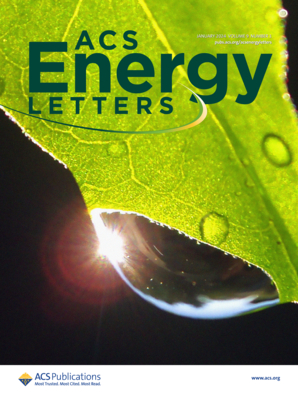基于硫化物的无阳极固态电池:主要挑战和新兴解决方案
IF 19.3
1区 材料科学
Q1 CHEMISTRY, PHYSICAL
引用次数: 0
摘要
基于硫化物的无阳极固态电池(afssb)已经成为下一代储能技术的变革性技术,在能量密度、安全性和制造可扩展性方面具有引人注目的优势。然而,这些电池面临着巨大的挑战,特别是容量的快速下降,目前限制了它们的实际应用。这篇综合综述严格审查了影响afssb的三个基本问题:裸露集流器上不均匀的锂成核,镀锂和硫化物电解质之间不稳定的界面,以及循环过程中界面空隙的形成。我们系统地评估了应对这些挑战的最新战略进展,包括金属种子涂层、转化反应基化合物和碳基中间层。本文还分析了先进的表征技术在理解失效机制和验证改进策略方面的关键作用,从冷冻fib - sem到operando方法。最后,对商业化所需的研究方向提出了前瞻性的展望。这项工作为理解和推进基于硫化物的afssb在下一代储能系统中的实际应用提供了一个全面的框架。本文章由计算机程序翻译,如有差异,请以英文原文为准。

Sulfide-Based Anode-Free Solid-State Batteries: Key Challenges and Emerging Solutions
Sulfide-based anode-free solid-state batteries (AFSSBs) have emerged as a transformative technology for next-generation energy storage, offering compelling advantages in energy density, safety, and manufacturing scalability. However, these batteries face significant challenges, particularly rapid capacity degradation that currently limits their practical implementation. This comprehensive review critically examines three fundamental issues affecting AFSSBs: nonuniform lithium nucleation on bare current collectors, unstable interfaces between plated lithium and sulfide electrolytes, and formation of interfacial voids during cycling. We systematically evaluate recent strategic advances in addressing these challenges, including metal seed coatings, conversion reaction-based compounds, and carbon-based interlayers. The review also analyzes the crucial role of advanced characterization techniques, from cryo-FIB-SEM to operando methods, in understanding failure mechanisms and validating improvement strategies. Finally, we present a forward-looking perspective on research directions necessary for commercialization. This work provides a thorough framework for understanding and advancing sulfide-based AFSSBs toward practical applications in next-generation energy storage systems.
求助全文
通过发布文献求助,成功后即可免费获取论文全文。
去求助
来源期刊

ACS Energy Letters
Energy-Renewable Energy, Sustainability and the Environment
CiteScore
31.20
自引率
5.00%
发文量
469
审稿时长
1 months
期刊介绍:
ACS Energy Letters is a monthly journal that publishes papers reporting new scientific advances in energy research. The journal focuses on topics that are of interest to scientists working in the fundamental and applied sciences. Rapid publication is a central criterion for acceptance, and the journal is known for its quick publication times, with an average of 4-6 weeks from submission to web publication in As Soon As Publishable format.
ACS Energy Letters is ranked as the number one journal in the Web of Science Electrochemistry category. It also ranks within the top 10 journals for Physical Chemistry, Energy & Fuels, and Nanoscience & Nanotechnology.
The journal offers several types of articles, including Letters, Energy Express, Perspectives, Reviews, Editorials, Viewpoints and Energy Focus. Additionally, authors have the option to submit videos that summarize or support the information presented in a Perspective or Review article, which can be highlighted on the journal's website. ACS Energy Letters is abstracted and indexed in Chemical Abstracts Service/SciFinder, EBSCO-summon, PubMed, Web of Science, Scopus and Portico.
 求助内容:
求助内容: 应助结果提醒方式:
应助结果提醒方式:


